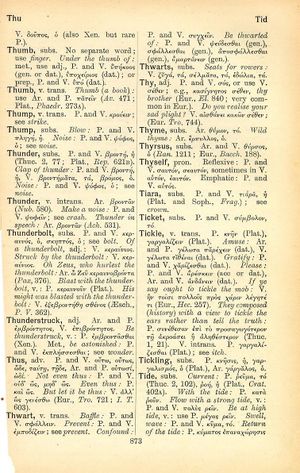thyrsus
θεωρεῖται δὲ ἀνοησίᾳ κρείττονι νοήσεως → it is grasped only by means of an ignorance superior to intellection, it may be immediately cognised only by means of a non-intellection superior to intellection
English > Greek (Woodhouse)
subs.
Ar. and V. θύρσος, ὁ (Ran. 1211; Eur., Bacch. 188).
Latin > English (Lewis & Short)
thyrsus: i, m., = θύρσος,>
I a stalk, stem of a plant.
I Lit., Plin. 19, 8, 39, § 129; 25, 8, 41, § 81; 26, 8, 33, § 51; Suet. Aug. 77; Col. 10, 370.—
II Transf.
A A staff twined round with ivy and vine-shoots, borne by Bacchus and the Bacchantes; the Bacchic staff, thyrsus, Hor. C. 2, 19, 8; Ov. M. 3, 542; 3, 712; 4, 7; 9, 641; 11, 28; Stat. Th. 9, 614; Sen. Herc. Fur. 904; id. Oedip. 628 al. — Hence, poet. transf.,
B A thorn, goad: acri Percussit thyrso laudis spes magna meum cor, Lucr. 1, 923; Ov. Tr. 4, 1, 43.

